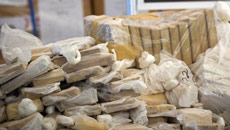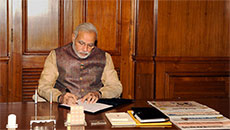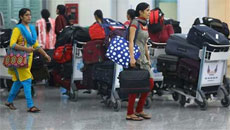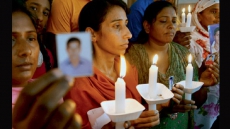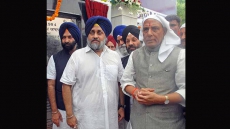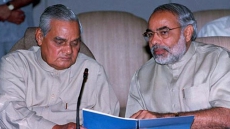Putting people to inconvenience and even causing suffering by blocking rail tracks and roads in Punjab could now have a legal complication for protesters. The state government has approved a bill under which blockade of rail and road traffic would attract punishment of up to one year in jail and even a penalty of Rs.100,000.
While the Parkash Singh Badal government may be trying to contain growing incidents of lawlessness in the state in recent times, the opposition Congress is aghast at the "draconian and anti-people legislation" to put curbs on protests and demonstrations.
Be it farmers, government employees, traders, members of various sects and others - Punjab has, in recent years, faced the fury of protesters.
This has forced the government to approve the new bill which will be tabled in the assembly session next week.
The cabinet has given approval to include the words "Blockade of Rail or Road Traffic" in The Punjab Prevention of Damage to Public and Private Property Bill-2014 defining "damaging act".
If the damage is done using explosives, the punishment would be up to two years and a fine of Rs.1 lakh. The offences will be non-bailable.
"This amendment would not only act as a deterrent for miscreants to participate in such agitations and demonstrations and cause damage to public and private property but will also help recover from them the damages on this count," the bill proposal says.

Punjab Congress president Partap Singh Bajwa has strongly opposed the move to put curbs on protests and demonstrations.
He said the Badal government had tried to push similar legislation in October 2010.
"However, following strong opposition from the people, it was withdrawn," Bajwa said.
The Congress, which has been at the forefront of criticising the Badal government for not containing lawlessness, now finds the proposed bill "a direct attack on the fundamental rights of the people and against all democratic norms".
For the Congress, the new bill is a "black law", "reminiscent of the days of slavery during the British era and the effort was to scuttle voices of dissent and freedom of expression and protest which was fundamental to any democratic system".
In recent years, there have been instances when the ruling Shiromani Akali Dal and alliance partner Bharatiya Janata Party (BJP) have let protests on the streets and rail tracks to have a free run. At times, this has resulted in heavy damage to public and private property.
As both sides indulge in posturing over the issue, it is the common people who have to suffer. After all, one man's right to protest can be another man's agony.
